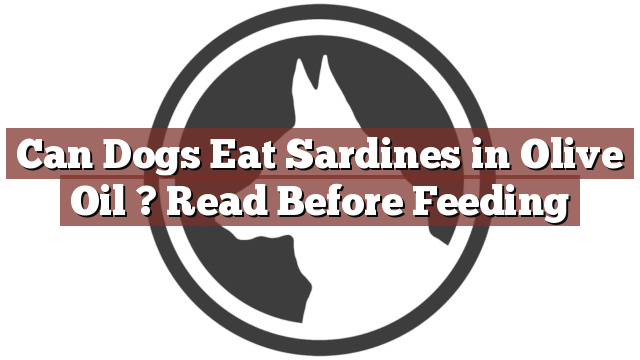Understanding Your Dog’s Dietary Needs
Proper nutrition is essential for the overall health and well-being of our furry friends. As responsible pet owners, it is our duty to provide them with a balanced diet that meets their specific dietary needs. Dogs require a combination of proteins, fats, carbohydrates, vitamins, and minerals to maintain optimal health. While it’s tempting to share our meals with our dogs, it’s important to remember that not all human foods are safe for them to consume.
Can Dogs Eat Sardines in Olive Oil? Read Before Feeding
Can dogs eat sardines in olive oil? This is a common question among pet owners who are looking for alternative sources of protein and omega-3 fatty acids for their dogs. The answer to this question is yes, dogs can eat sardines in olive oil in moderation. Sardines are packed with nutrients that can be beneficial for your furry friend’s health. However, it’s crucial to keep a few things in mind before feeding sardines to your dog.
Pros and Cons of Feeding Sardines in Olive Oil to Your Dog
Feeding sardines in olive oil to your dog can have both pros and cons. Let’s start with the benefits. Sardines are an excellent source of protein, omega-3 fatty acids, and essential minerals like calcium and phosphorus. These nutrients play a vital role in maintaining your dog’s healthy skin, coat, and joints. Omega-3 fatty acids are also known for their anti-inflammatory properties, which can be beneficial for dogs with arthritis or other inflammatory conditions.
However, it’s crucial to consider the potential drawbacks as well. Sardines are high in sodium, so if your dog has any underlying health issues that require a low-sodium diet, it’s best to avoid feeding them sardines. Additionally, sardines in olive oil can be high in calories, so if your dog is overweight or prone to weight gain, it’s important to feed them sardines in moderation. Finally, always check the label for any added ingredients or preservatives that may not be suitable for your dog.
In Conclusion: Weighing the Benefits and Risks of Feeding Sardines in Olive Oil to Your Dog
In conclusion, dogs can eat sardines in olive oil, but it’s important to do so in moderation and with caution. The key is to consider your dog’s individual dietary needs and any underlying health issues they may have. If you decide to introduce sardines into your dog’s diet, start with small portions and observe how they react. If you notice any digestive upset or adverse reactions, it’s best to consult with your veterinarian. As always, it’s important to remember that no single food can provide all the nutrients your dog needs, so sardines should be incorporated as part of a balanced diet.
Thank you for taking the time to read through our exploration of [page_title]. As every dog lover knows, our furry friends have unique dietary needs and responses, often varying from one canine to another. This is why it's paramount to approach any changes in their diet with caution and knowledge.
Before introducing any new treats or making alterations to your dog's diet based on our insights, it's crucial to consult with a veterinarian about [page_title]. Their expertise ensures that the choices you make are well-suited to your particular pet's health and well-being.
Even seemingly harmless foods can sometimes lead to allergic reactions or digestive issues, which is why monitoring your dog after introducing any new food item is essential.
The content provided here on [page_title] is crafted with care, thorough research, and a genuine love for dogs. Nevertheless, it serves as a general guideline and should not be considered a substitute for professional veterinary advice.
Always prioritize the expert insights of your veterinarian, and remember that the health and happiness of your furry companion come first.
May your journey with your pet continue to be filled with joy, love, and safe culinary adventures. Happy reading, and even happier snacking for your canine friend!

